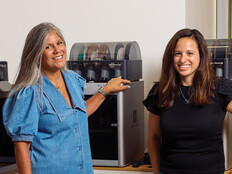Google Supports Ed Tech Research into Modern Classrooms
Educators consider laptops, like the ever-popular Chromebook, to be the most effective technology in the classroom.
The Economist Intelligence Unit, with some help from Google for Education, explored the critical role of technology in the classroom in the recently released report, “Fostering exploration and excellence in 21st century schools.” The report, which surveyed 1,200 teachers in 16 countries, found that laptops still aid teaching better than any other form of technology.
It also found that teachers highly value technology to increase flexible, active and personalized learning opportunities.
Increasing personalization is precisely what Google had in mind when it announced a new batch of 2-in-1 Chromebooks in mid-January. The Lenovo 500e Chromebook and the Dell Chromebook 5190 have cameras on two sides, stylus capabilities, large screens and a flexible design.
The tech giant also announced that more Chromebooks from brands such as Acer, HP, Dell, Asus and Lenovo are coming later this year. These new devices will come in “many shapes, sizes and price points, so there’s a device that works for every learner,” Google reports.
With educators clearly valuing laptops, these flexible devices are incredibly timely and in line with the EIU research showing technology’s role in preparing students for the future.
SIGN UP: Get more news from the EdTech newsletter in your inbox every two weeks!
Technology Promotes Skills Students Will Need
The EIU report notes that in order for today’s students to be ready for the workforce, they need to not only understand how to work with technology, but how to work differently from automated technology.
“As routine tasks are further replaced by automation, jobs in the 21st century will require very different demands, underscoring the need to prepare children of today for a different world than the one of the previous generations,” reads the report.
To do this, educators at the K–12 level must instill soft skills such as collaboration and critical thinking.
The report notes that educators across the globe believe a wide range of teaching strategies are needed to do this. Examples of such strategies include active learning, project-based learning and personalized learning.
Largely, these educators also believe that technology is a critical component of executing these learning strategies. The EIU report found that 46 percent of educators agree strongly that technology is valuable for helping students develop skills for the modern workplace.
More than three-quarters of respondents (76 percent) say tech enhances project-based learning and nearly as many believe it can make education more collaborative (75 percent) and personalized (72 percent).
The teachers surveyed indicate that laptops, educational games, interactive whiteboards, educational videos, tablets and apps are among the most helpful technologies.
“These technologies can allow [for] individually tailored modules, free up teachers’ time and provide access to innovative lesson plans,” reads the report.









